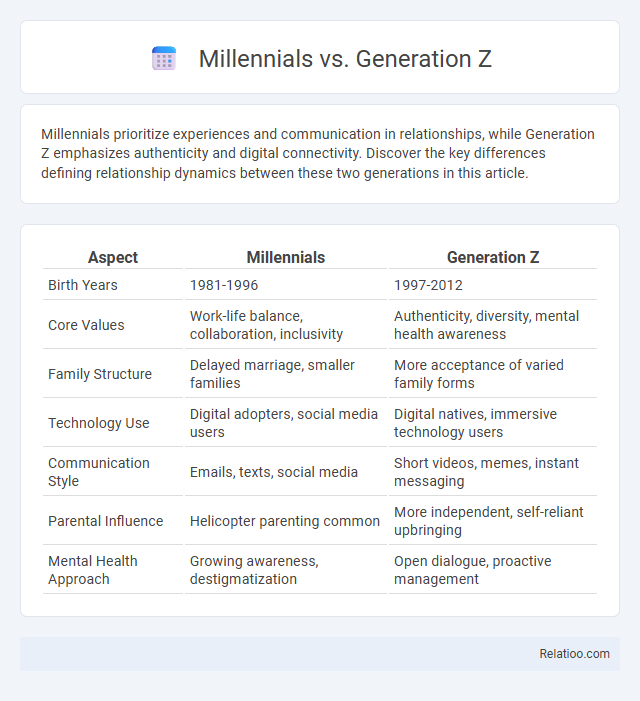Millennials prioritize experiences and communication in relationships, while Generation Z emphasizes authenticity and digital connectivity. Discover the key differences defining relationship dynamics between these two generations in this article.
Table of Comparison
| Aspect | Millennials | Generation Z |
|---|---|---|
| Birth Years | 1981-1996 | 1997-2012 |
| Core Values | Work-life balance, collaboration, inclusivity | Authenticity, diversity, mental health awareness |
| Family Structure | Delayed marriage, smaller families | More acceptance of varied family forms |
| Technology Use | Digital adopters, social media users | Digital natives, immersive technology users |
| Communication Style | Emails, texts, social media | Short videos, memes, instant messaging |
| Parental Influence | Helicopter parenting common | More independent, self-reliant upbringing |
| Mental Health Approach | Growing awareness, destigmatization | Open dialogue, proactive management |
Defining Millennials and Generation Z
Millennials, born between 1981 and 1996, are characterized by their adaptation to the rise of the internet and social media during their formative years, influencing their communication and work habits. Generation Z, born from 1997 to 2012, is the first cohort to grow up entirely in the digital age, exhibiting a strong proficiency with technology, social activism, and a preference for personalized content. The generational gap between Millennials and Generation Z highlights differences in values, technological fluency, and social attitudes shaped by their distinct cultural and economic environments.
Key Differences in Upbringing
Millennials, born between 1981 and 1996, experienced a childhood marked by the rise of the internet and economic shifts such as the 2008 financial crisis, fostering adaptability and a focus on work-life balance. Generation Z, born from 1997 onwards, grew up with pervasive digital technology and social media, emphasizing instant connectivity, inclusivity, and mental health awareness. The generational gap highlights differences in communication styles, technology usage, and value systems shaped by distinct socio-economic contexts and technological advancements.
Educational Trends: Millennials vs Gen Z
Millennials favor flexible online learning and value collaborative environments, while Generation Z emphasizes personalized education driven by advanced technology like AI and virtual reality. Your education strategy should integrate digital tools and interactive platforms to meet Gen Z's demand for immersive, customized experiences. Understanding these generational differences helps close the educational gap by adapting teaching methods to each group's unique preferences and learning styles.
Technology Use and Digital Natives
Millennials and Generation Z both exhibit advanced technology use, with Millennials pioneering early social media and Generation Z growing up fully immersed as true digital natives. Generation Z demonstrates higher proficiency in multitasking across digital platforms, preferring video-based content and real-time communication, while Millennials tend to balance traditional and digital media consumption. The generational gap manifests in distinct technology adoption rates, digital literacy levels, and preferences for online privacy and interaction styles.
Social Media Preferences
Millennials tend to favor platforms like Facebook and Instagram for social media interaction, while Generation Z gravitates toward TikTok and Snapchat due to their preference for short-form, visually-driven content. The generational gap reflects differing values and communication styles, with Millennials emphasizing connection and authenticity, whereas Generation Z prioritizes creativity and immediacy. Understanding these distinct social media preferences can help you tailor your digital marketing strategy to effectively engage each audience group.
Attitudes Toward Work and Career
Millennials tend to prioritize work-life balance and meaningful career experiences, often valuing flexibility and purpose over job security. Generation Z, raised amidst rapid digital advancement, emphasizes job stability, financial security, and opportunities for growth, while also expecting inclusive and diverse work environments. Understanding the generational gap in attitudes toward work helps you tailor workplace policies and communication to engage all employees effectively.
Values and Social Awareness
Millennials prioritize authenticity, social justice, and environmental sustainability, often engaging in activism through digital platforms. Generation Z demonstrates heightened social awareness, emphasizing diversity, mental health, and climate change, leveraging social media for advocacy and community building. The generational gap reflects distinct value systems shaped by evolving technology, economic conditions, and cultural shifts, influencing differing perspectives on identity, work, and social responsibility.
Consumer Behavior and Brand Loyalty
Millennials exhibit strong brand loyalty driven by value alignment and digital engagement, often favoring established brands with ethical practices. Generation Z prioritizes authenticity and personalized experiences, showing a preference for brands that engage on social media and support social causes. The generational gap reflects contrasting consumer behavior, with Millennials relying on brand trust and Gen Z emphasizing innovation and social responsibility in purchasing decisions.
Communication Styles and Preferences
Millennials favor digital communication platforms like email and social media for professional and personal interactions, valuing clarity and speed. Generation Z prefers instant messaging apps, video calls, and multimedia content, emphasizing authenticity and visual engagement. Understanding your communication style helps bridge the generational gap, fostering more effective and inclusive conversations across age groups.
Challenges and Opportunities for the Future
Millennials and Generation Z face distinct challenges rooted in economic instability, digital transformation, and evolving social values, shaping unique perspectives on work and life balance. The generational gap reveals opportunities for cross-generational collaboration, leveraging Millennials' experience with Gen Z's tech-savviness to drive innovation and address societal issues. Your ability to navigate these dynamics can foster inclusive environments that harness diverse strengths, preparing for a future that values adaptability and empathy.

Infographic: Millennials vs Generation Z
 relatioo.com
relatioo.com